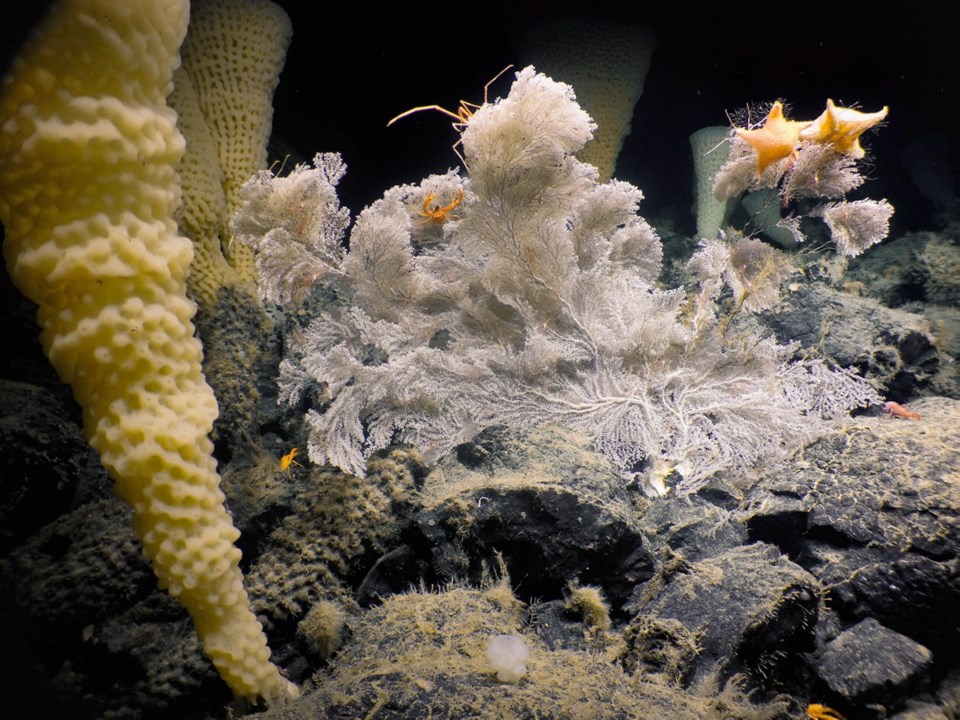It’s been one discovery after another for Canadian scientists exploring the ocean depths a few hundred kilometres off the coast of Vancouver Island.
On expeditions in 2018 and 2019, researchers found massive undersea mountains, never-before-seen organisms and a vast city of deep sea sponges that they nicknamed Spongetopia.
Their latest findings, however, have cast those earlier discoveries in a more sobering light.
In the first published study coming out of the expeditions, the scientists report that many of the newly observed species might already be on the way out.
“What we have found is evidence of climate change in the deep sea,” said Cherisse Du Preez, a marine biologist with the Department of Fisheries and Oceans and a member of the seamount expeditions in 2018 and 2019.
“It isn’t what we were looking for when we went out there. We went out there to catalogue the life. But what we found is that ocean acidification is rising, the oxygen is dropping.
“We have a 60-year time series that shows that this is significant and we’re finding this is having an impact on the animals that we’ve just newly discovered are down there.”
Du Preez and fellow scientists Tetjana Ross and Debby Ianson report that local extinctions in the deep sea will become common within a few decades if the trend persists.
“We were surprised that the changes were happening as rapidly as they were that deep in the ocean, because this sort of signal we expect to be communicated closer to the surface,” said Ianson, a biogeochemical oceanographer with the Department of Fisheries and Oceans.
Ianson and Du Preez both said they hope the paper sounds an alarm.
“What we want to do is warn people that now’s the time to mitigate every direct human impact that we can, because we have to buffer these animals from what’s about to happen to them,” Du Preez said.
In that sense, she said, their research underlines the importance of work being done by the Canadian government and First Nations along the coast to create large marine protected areas to shield creature from seabed mining and harmful fishing practices.
The Explorer Seamount, for example, an underwater volcano that rises 2.5 kilometres from the ocean floor and rivals Mount Baker in height, sits at the centre of 133,000 square kilometres of ocean that sa���ʴ�ý declared an Offshore Pacific Area of Interest in 2017.
At the time, the federal government said it intended to make the region one of sa���ʴ�ý’s largest Marine Protected Areas by 2020.
Ianson said Canadians can only do so much to reduce the worldwide emissions that are causing the planet to warm.
“You know, that part is something that’s a global problem,” she said. “But what we can do is actually say, ‘Hey, we’re not going to put more stress on these creatures. We’re not going to fish them. We’re not going to allow deep-sea mining or things like that.’
“In a way, that’s the feel-good story because we can do something about this,” she said. “And hopefully people realize that climate change is progressing a little more rapidly than many things can adapt.”
Du Preez admitted that it’s been gut-wrenching for scientists to find so many new species in recent years only to learn that many of them are facing extinction.
“You have no idea,” she said. “It’s very strange, because we’re working with taxonomists to identify these animals, to name them.
“So we’re discussing these animals that are brand new to science, and we’re explaining how it is that they may no longer be around very long. That’s very sobering.
“But nature’s a remarkable thing and if we can just give them a wide berth and buffer for these impacts, they stand a better chance.”



